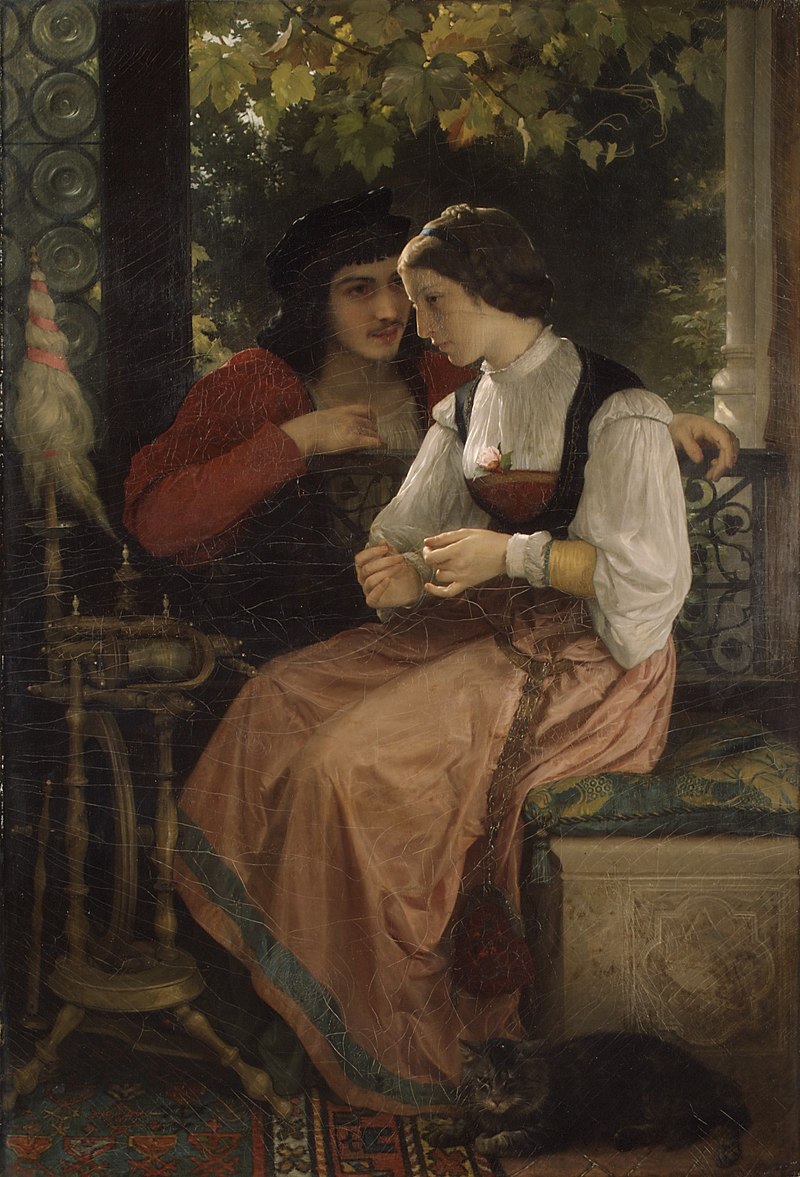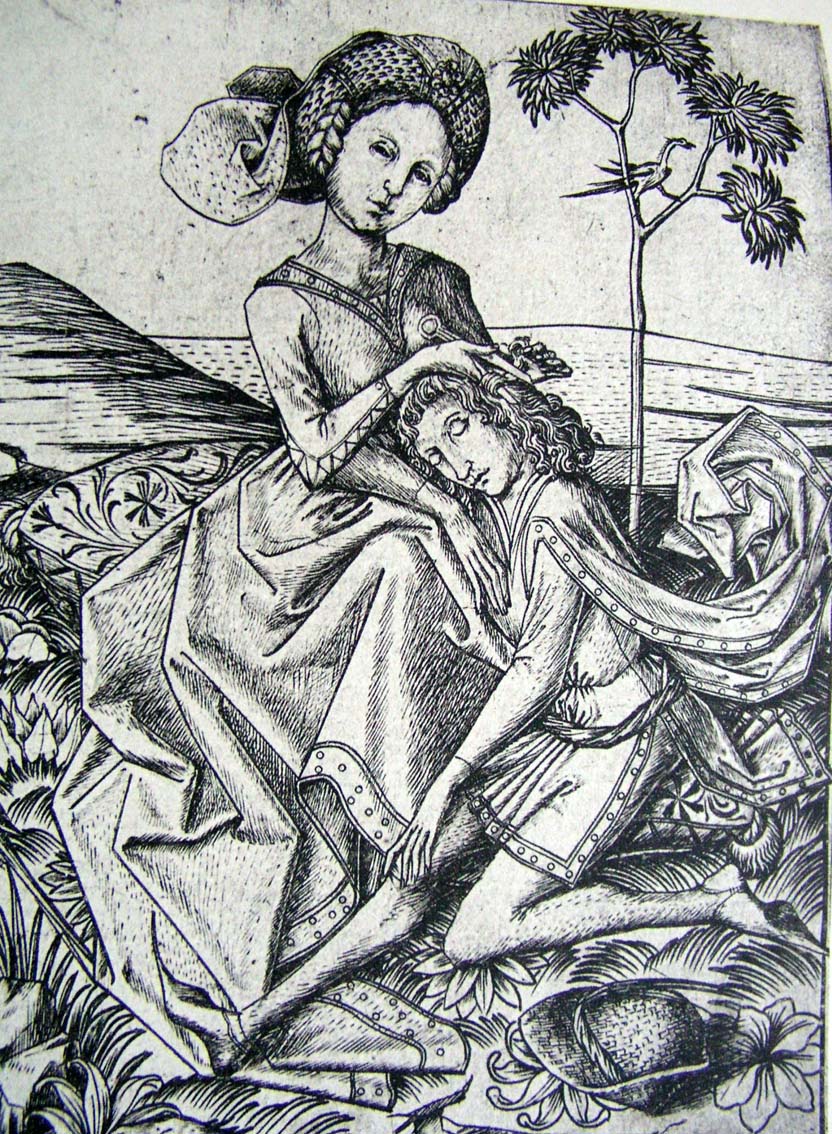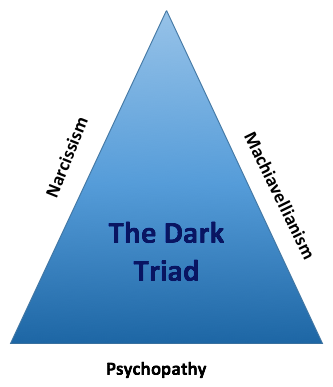
性的誘惑
Seduction
Don
Juan in Mozart's opera Don Giovanni, a painting by Max Slevogt
☆
性的な意味での誘惑(seduction)
とは、他人を性的交渉やその他の性的行為に誘い込むことを意味する。[1]
誘惑の戦略には、会話や性的な台本[2]、パラ言語的特徴[3]、非言語コミュニケーション[4][5]、短期行動戦略[6]などがある。
誘惑という言葉はラテン語に由来し、文字通り「迷わせる」ことを意味する[7]。否定的にとらえれば、誘惑とは、性的な興奮状態になければしなかったであ
ろう行動の選択を強要するために、誘惑し、誘惑することであり、多くの場合、本質的に性的なものである。肯定的にとらえれば、誘惑とは、男性であれ女性で
あれ、感覚に訴えることによって誰かを魅了する行為と同義であり、多くの場合、根拠のない恐怖を軽減し、「性的解放」に導くことを目的とする。現代の学術
的な議論では、誘惑の道徳性は行為そのものよりもむしろ、関係する個人への長期的な影響に依存し、必ずしも辞書の定義に表されているような否定的な意味合
いを持つものではないとする見解もある[8]。
歴史や伝説上の有名な誘惑者には、リリス、ジャコモ・カサノバ、架空の人物ドン・ファンなどがいる。インターネットとテクノロジーの出現は、口説きに関す
る言説に基づく口説きコミュニティの存在と利用可能性を支えてきた。これは主に「ナンパ師」(PUA)によるものだ。誘惑はまた、コンプライアンスと意欲
を高めるためにマーケティングにも利用されている[9]。
| In sexuality,
seduction means enticing someone else into sexual intercourse or other
sexual activity.[1] Strategies of seduction include conversation and
sexual scripts,[2] paralingual features,[3] non-verbal
communication,[4][5] and short-term behavioural strategies.[6] The word seduction stems from Latin and means, literally, 'leading astray'.[7] As a result, the term may have a negative connotation. Seen negatively, seduction involves temptation and enticement, often sexual in nature, to coerce someone into a behavioural choice they would not have made if they were not in a state of sexual arousal. Seen positively, seduction is synonymous for the act of charming someone—male or female—by an appeal to the senses, often with the goal of reducing unfounded fears and leading to "sexual emancipation". Some sides in contemporary academic debate state that the morality of seduction depends on the long-term impacts on the individuals concerned, rather than the act itself, and may not necessarily carry the negative connotations expressed in dictionary definitions.[8] Famous seducers from history or legend include Lilith, Giacomo Casanova, and the fictional character Don Juan. The emergence of the internet and technology has supported the availability and the existence of a seduction community, which is based on discourse about seduction. This is predominantly by "pickup artists" (PUA). Seduction is also used within marketing to increase compliance and willingness.[9] |
性的な意味での誘惑とは、他人を性的交渉やその他の性的行為に誘い込む
ことを意味する。[1]
誘惑の戦略には、会話や性的な台本[2]、パラ言語的特徴[3]、非言語コミュニケーション[4][5]、短期行動戦略[6]などがある。 誘惑という言葉はラテン語に由来し、文字通り「迷わせる」ことを意味する[7]。否定的にとらえれば、誘惑とは、性的な興奮状態になければしなかったであ ろう行動の選択を強要するために、誘惑し、誘惑することであり、多くの場合、本質的に性的なものである。肯定的にとらえれば、誘惑とは、男性であれ女性で あれ、感覚に訴えることによって誰かを魅了する行為と同義であり、多くの場合、根拠のない恐怖を軽減し、「性的解放」に導くことを目的とする。現代の学術 的な議論では、誘惑の道徳性は行為そのものよりもむしろ、関係する個人への長期的な影響に依存し、必ずしも辞書の定義に表されているような否定的な意味合 いを持つものではないとする見解もある[8]。 歴史や伝説上の有名な誘惑者には、リリス、ジャコモ・カサノバ、架空の人物ドン・ファンなどがいる。インターネットとテクノロジーの出現は、口説きに関す る言説に基づく口説きコミュニティの存在と利用可能性を支えてきた。これは主に「ナンパ師」(PUA)によるものだ。誘惑はまた、コンプライアンスと意欲 を高めるためにマーケティングにも利用されている[9]。 |
History The Proposition (1872), William-Adolphe Bouguereau (1825–1905) Seduction is a popular motif in history and fiction, both as a warning of the social consequences of engaging in the behaviour or becoming its victim, and as a salute to a powerful skill.[10] In the Bible, Eve offers the forbidden fruit to Adam. Eve herself was verbally seduced by the serpent, believed in Christianity to be Satan; later, Chapter 7 of Proverbs warns of the pitfalls of seduction. Sirens of Greek mythology lured sailors to their death by singing them to shipwreck; Cleopatra beguiled both Julius Caesar and Marc Antony, Dionysus was the Greek god of seduction and wine. Famous male seducers, their names synonymous with sexual allure, range from Genji to John Wilmot, 2nd Earl of Rochester[11] and James Bond. In biblical times, because unmarried females who lost their virginity had also lost much of their value as marriage prospects, the Old Testament Book of Exodus specifies that the seducer must marry his victim or pay her father to compensate him for his loss of the marriage price: "And if a man entice a maid that is not betrothed, and lie with her, he shall surely endow her to be his wife. If her father utterly refuse to give her unto him, he shall pay money according to the dowry of virgins." The Book of Judges in the Old Testament describes Delilah seducing Samson who was given great strength by God, but ultimately lost his strength when she allowed the Philistines to shave his hair off during his slumber.[12] |
歴史 『プロポジション』(1872年)ウィリアム=アドルフ・ブグロー(1825-1905年) 誘惑は歴史やフィクションにおいて人気のあるモチーフであり、その行為に関与したり、その犠牲者になったりすることの社会的結果に対する警告として、また 強力なスキルに対する敬意の表れとして描かれる[10]。その後、箴言の第7章は誘惑の落とし穴について警告している。ギリシャ神話のセイレーンは船乗り を歌で誘い、難破させて死に至らしめた。クレオパトラはユリウス・カエサルとマルク・アントニーを誘惑し、ディオニュソスはギリシャ神話の誘惑とワインの 神だった。有名な男性の誘惑者は、源氏からロチェスター伯爵ジョン・ウィルモット[11]、ジェームズ・ボンドに至るまで、その名前が性的魅力の代名詞と なっている。 聖書の時代には、処女を失った未婚の女性は結婚相手としての価値も失っていたため、旧約聖書の『出エジプト記』には、誘惑者は被害者と結婚するか、彼女の 父親に結婚の代償を支払わなければならないと規定されている: 「もし男が、婚約していない乙女を誘惑して、その女と寝るならば、彼は必ずその女を妻にしなければならない。もし彼女の父が、彼女を彼に与えることを全く 拒むならば、彼は処女の持参金に応じて金銭を支払わなければならない。」 旧約聖書の士師記には、神から偉大な力を与えられたサムソンを誘惑したデリラが、ペリシテ人が彼の眠りの間に彼の髪を剃り落とすのを許したために、最終的に彼の力を失ったことが描かれている[12]。 |
 Delilah cutting Samson's hair, c. 1460 Use in sexual relationships Males and females both implement the strategy of seduction as a method of negotiating their sexual relationships.[13] This can often involve manipulation of other individuals. This is primarily based on desire, normally physical, as well as attraction towards them. Popular phrases often used include; 'the language of love is universal'.[14] These phrases help to demonstrate the extensively pervasive and ubiquitous strategy use within love and relationships amongst humans. Individuals employing such strategies often do so subconsciously and will merely report the feelings and thoughts that they subjectively experienced and are colloquially comparable to 'attraction'[15] or 'love'.[16] Research has indicated that seduction could substitute or equate to a form of collapsed or condensed courtship.[6] Evolutionary psychology suggests that this form of sexual enticement can be used in order to cajole desired individuals to engage in sexual intercourse and ultimately reproduce. This behaviour is also aimed at persuading someone to develop a short-term or long-term sexual relationship with them. Males declare that they adopt the strategy of seduction statistically more frequently than females.[13] From an evolutionary perspective, this has been linked with females' higher parental investment and the lack of guarantee of male parental investment,[17] although evolutionary science cannot draw a causal relationship between the two factors. Females therefore need to be seduced more prior to engaging in sexual intercourse. Men more commonly wish to engage in more frequent short-term mating,[18] which may require this strategy of seduction used to access the female for intercourse. However, this finding has been contradicted by non-verbal seduction results which indicate that females have more control within this area.[14] Other potential strategies individuals employ to gain access to a mate include courting or having relatives select mates for socioeconomic reasons.[14] Ultimately, both males and females have reported preferring seduction above all other strategies, such as the use of power or aggression, for making a potential partner agree to sexual intercourse.[13][14] |
 サムソンの髪を切るデリラ、1460年頃 性的関係における使用 男性も女性も、性的関係を交渉する方法として誘惑の戦略を実行する[13]。 これはしばしば他の個人を操ることを含むことがある。これは主に欲望、通常は肉体的な欲望、および相手に対する魅力に基づいている。よく使われるフレーズ に、「愛の言葉は世界共通である」[14]というものがある。これらのフレーズは、人間の恋愛や人間関係の中で、広く浸透し、どこにでもある戦略が使われ ていることを示すのに役立つ。このような戦略を用いる個人はしばしば無意識のうちにそうしており、単に主観的に経験した感情や思考を報告するだけであり、 口語的には「魅力」[15]や「愛」に匹敵する[16]。 進化心理学によれば、このような性的誘惑の形態は、希望する個体 をおだてて性交渉に参加させ、最終的には繁殖させるために利用される。この行動はまた、相手を説得して短期的または長期的な性的関係を築くことも目的とし ている。進化学的な観点からは、これはメスの親への投資の高さと、オスの親への投資の保証の欠如と関連しているが[17]、進化学はこの2つの要因の因果 関係を導き出すことはできない。したがって、メスは性交渉に至る前に、より誘惑される必要がある。男性はより一般的に、より頻繁に短期間の交尾を行いたい と考えており[18]、性交のためにメスに接近するためにこのような誘惑戦略が必要なのかもしれない。しかし、この発見は、非言語的な誘惑の結果とは矛盾 しており、この領域では女性の方がより多くの支配力を持っていることを示している[14]。最終的に、男性と女性の両方が、潜在的なパートナーに性交に同 意させるために、権力や攻撃性の使用などの他のすべての戦略よりも誘惑を好むと報告している[13][14]。 |
| Human mate poaching Seduction is related to human mate poaching.[19] Human mate poaching refers to when either a male or female purposefully entices another individual who is already in an established relationship into sexual relations with them. This is akin to the definition of seduction in the introduction. This is a psychological mechanism which had unconscious and conscious manifestations, that in relation to evolutionary psychology has been adaptive to our ancestors in the past and has continued to be functional in modern society.[19] Human mate poaching is a form of seduction, and can be used as a short-term and long-term mating strategy among both sexes. Moreover, there are associated costs and benefits to poaching. Schmitt and Buss (2001)[19] investigated the potential costs and benefits across sexes in relation to human mate poaching. Costs for engaging in poaching behaviours include unwanted pregnancy, transmitted infection and diseases, and insecurity about provisions (shelter, food, and financial security) and/or resource depletion, violence and aggression from the current partner, who takes part in human mate guarding behaviours (behaviours used to protect their mate from other potential males or females). However, the associated benefits include emotional support that may not be received from a current partner, and access to 'good genes', such as facial symmetry.[20] The associated benefits also include increased sexual variety, access to physically attractive mates, and non-committal copulations. Evolutionarily speaking, we are descended from our reproductively-successful ancestors who managed to solve the adaptive problem of finding a mate with the required characteristics needed at that time in their lives, e.g., plenty of resources, physical attractiveness, and showing signs of honest fertility. Therefore, our ancestors would have deployed this tactic (for enticing a suitable mate), which remains in our psychology. Some evolved poaching behaviours may not be suitable for current environmental problems. Leftover by-products from human evolution, such as preferences for fat and sugar,[21] are not adaptive in western cultures at present, and thus similar poaching behaviours could still remain. |
ヒトの配偶者密猟(仮説) 誘惑はヒトの配偶者密猟と関連している[19]。ヒトの配偶者密猟とは、男性または女性のいずれかが、すでに確立された関係にある他の個人を意図的に誘惑 し、彼らと性的関係を結ぶことを指す。これは冒頭の誘惑の定義に似ている。これは無意識的・意識的に現れる心理的メカニズムであり、進化心理学との関係で は、過去の祖先に適応的であり、現代社会でも機能し続けている[19]。 ヒトの交尾相手の密猟は誘惑の一形態であり、両性間で短期的・長期的な交尾戦略として用いられることがある。さらに、密猟には関連費用と利益がある。 SchmittとBuss(2001)[19]は、ヒトの交尾相手の密猟に関連して、男女間の潜在的なコストと利益を調査した。密猟行動に関与するコスト には、望まない妊娠、感染症、疾病、および(シェルター、食料、経済的な)供給に対する不安、および(または)資源の枯渇、ヒトの配偶者保護行動(他の潜 在的なオスまたはメスから配偶者を守るための行動)に参加する現在のパートナーからの暴力や攻撃が含まれる。しかし、それに関連する利益には、現在のパー トナーからは受けられないかもしれない感情的なサポートや、顔の対称性などの「良い遺伝子」へのアクセスが含まれる[20]。また、それに関連する利益に は、性的多様性の増加、肉体的に魅力的な相手へのアクセス、非同盟的な交尾などが含まれる。 進化論的に言えば、私たちは生殖に成功した祖先の子孫であり、その祖先は、その時点で必要とされる特性、例えば、豊富な資源、身体的魅力、誠実な生殖能力 の兆候を示す伴侶を見つけるという適応的問題を解決することができた。そのため、私たちの祖先は(適切な伴侶を誘い出すために)このような戦術をとったは ずであり、それは私たちの心理に残っている。進化した密猟行動の中には、現在の環境問題にはそぐわないものもあるかもしれない。脂肪や糖分に対する嗜好性 [21]のような、人類の進化から残った副産物は、現在の西洋文化では適応的ではないため、同様の密猟行動がまだ残っている可能性がある。 |
| Short term In males Short-term strategies involved in seduction are associated with the dark triad,[22] however predominantly in males. Short-term strategies are those used by an individual to obtain a mate for a short term sexual encounter.[23]  The Dark Triad, proposed by Paulhus and Williams (2002) The dark triad is made up of three personality traits, psychopathy, narcissism and Machiavellianism and was proposed by Paulhus and Williams (2002).[23] The three traits are exploitative in nature and are used for sexually coercive behaviours, useful in the seduction process. Typically these three traits are deemed maladaptive for the individual and society. Nevertheless, these traits have been found to be adaptive in an exploitative strategy in short term mating.[24] Dark triad traits are adaptive for an unrestricted sociosexuality and promiscuous behaviours.[23] The three traits are associated with impulsivity, manipulative behaviours and lack of empathy. These personality traits would be useful in seducing a partner for a short term encounter.[24] From an evolutionary perspective, these would have been particularly beneficial to our ancestral males who wanted to increase their reproductive success, through seducing many women and therefore increasing their chance of passing on their genes. These particular traits may be used as a tactic for increasing success in mating. The dark triad traits are seen more in males where the parental investment is lower. Having numerous copulations with many women increases the likelihood their genes will be passed on. Comparatively, a woman has to invest time and a lot of energy in carrying an infant and looking after him/her for many years subsequently. |
短期 男性の場合 誘惑に関わる短期戦略はダークトライアッドと関連しているが[22]、 主に男性においてである。短期的戦略とは個人が短期的な性的出会いのために相手を得るために使用する戦略である[23]。  パウルフスとウィリアムズ(2002)によって提唱されたダークトライアド ダーク・トライアッドは、サイコパス、ナルシシズム、マキャベリズムという3つの性格特性から構成され、パウルフスとウィリアムズ(2002年)によって 提唱された。一般的にこれらの3つの特性は、個人にとっても社会にとっても不適応とみなされる。とはいえ、これらの特性は短期的な交尾における搾取的戦略 において適応的であることが判明している[24]。ダークトライアッドの特性は、制限のない社会的性欲や乱交行動に適応的である[23]。これらの性格特 性は、短期的な出会いを求めて相手を誘惑するのに有効である[24]。進化の観点から見ると、これらは、多くの女性を誘惑することで繁殖の成功を高め、遺 伝子を受け継ぐ機会を増やしたいと考えていた祖先の男性にとって、特に有益であったと考えられる。これらの特殊な特徴は、交尾の成功を高めるための戦術と して使われたのかもしれない。 ダークトライアッドの特徴は、親への投資が少ないオスにより多く見られる。多くの女性と何度も交尾をすることで、遺伝子が受け継がれる可能性が高くなる。比較的、女性は乳児を身ごもり、その後何年も世話をするために時間と多くのエネルギーを投資しなければならない。 |
| In females The triad of traits ancestrally would not have been adaptive for women, because females were and still are less likely or less willing to engage in casual sex,[25][26] because of the lack of certainty of resources to provide for her and her offspring. Additionally, there are other potential considerations of the implication of short-term strategies. Males cannot employ such strategies without there being willing females to engage in sexual intercourse within a short-term relationship with them. Therefore, benefits from engaging in multiple short-term mating must also exist for females. These matings enable females to practice and enhance their skills, specifically within attraction and seduction.[27] This often occurs during extra-pair mating when females have sexual intercourse with males other than their husband.[27] There are potential benefits for females to engage in these matings, including the ability to acquire more resources. For example, females are better able to access meats, goods or services in exchange for sexual intercourse or if she were to give birth to a child whose father has better genes than her husband.[28] Females use these short-term matings to hone their mating and seduction skills and increase their protection. This is because males often provide increased protection against other males exploitation or from non-humans for the females they mate with and their offspring.[29] However, this willingness to make the first move towards seduction and engage in a sexual relationship may be subtle.[30] For example, females may simply stand close to their target.[31] Improving attraction and seduction skills can also help a female with acquiring a better or more desirable male according to the 'Mate Switching Hypothesis'.[27] This is because, females are able to assess their potential mate before committing to a long-term relationship.[18] Alternatively, according to this hypothesis females are also able to get rid of an unwanted husband through mate expulsion using short-term strategies, such as by seducing another man into a short-term sexual relationship.[28] Females may also be more equipped at deterring male partners from future infidelity, demonstrated by the 'Mate Manipulation Hypothesis'.[27] This hypothesis suggests that females are able to use revenge to deter future infidelity. This can be achieved by a female partaking in a short-term affair, incorporating the use of seduction, with another male as a revenge tactic for her husband's previous affair, which aims to increase commitment of her intended long-term mate.[28][32] These hypotheses indicate the benefits for females of developing and expanding on their seduction skills within sexual relationships. |
女性の場合 メスは昔も今も、自分とその子孫を養うための資源が確実でないため、気軽なセックスをする可能性が低かったり、あまりしたがらなかったりするからである[25][26]。 さらに、短期的な戦略の意味合いについては、他にも考えられることがある。オスは、短期的な関係の中で性交渉を行ってくれるメスがいなければ、そのような 戦略をとることはできない。したがって、メスにとっても短期的な交尾を複数回行うことによる利益は存在するはずである。このような交尾は、雌が夫以外の雄 と性交渉を持つペア外交尾の間にしばしば起こる[27]。例えば、メスは性交渉と引き換えに肉や商品、サービスを利用しやすくなったり、父親が夫よりも優 れた遺伝子を持つ子供を出産しやすくなったりする[28]。メスはこのような短期間の交尾を利用して交尾や誘惑のスキルを磨き、保護力を高める。というの も、オスは交尾したメスとその子孫のために、他のオスの搾取や非人間からの保護を強化することが多いからである[29]。しかし、このように誘惑に向けた 最初の一歩を踏み出し、性的関係を結ぼうとする意欲は、微妙なものかもしれない[30]。 魅力と誘惑のスキルを向上させることは、「メイト・スイッチング仮説」[27]によれば、メスがより良い、あるいはより望ましいオスを獲得することにも役 立つ。 [18]あるいは、この仮説によれば、メスは別の男性を短期的な性的関係に誘惑するなど、短期的な戦略を用いて仲間はずれにすることで、望まない夫を追い 出すこともできる[28]。 この仮説は、メスが復讐を用いて将来の不倫を抑止できることを示唆している[27]。これは、女性が夫の以前の不倫に対する復讐戦術として、別の男性と誘 惑を利用した短期的な不倫をすることによって達成することができ、長期的な交際相手のコミットメントを高めることを目的としている[28][32]。これ らの仮説は、性的関係の中で誘惑のスキルを開発し、拡大することが女性にとって有益であることを示している。 |
| Long term 'Strategies are defined as evolved solutions to adaptive problems'.[33] Men and women differ in the adaptive problems that they face, and therefore deploy different strategies. Women strongly desire the resources and commitment that comes with paternal parental investment and therefore impose a longer period of time for courtship and use of seduction prior to engaging in a long-term sexual relationship. Women also spend time seeking and seducing men that are willing to invest and commit in the long run.[34] It is likely that exploitative strategies will not be used when seducing a long-term partner.[23] The traits associated within the dark triad (Machiavellianism, psychopathy and narcissism) are not useful for long term mating strategies because they are negatively correlated with agreeableness, empathy and reciprocation, which are traits promoting a healthy relationship.[24] |
長期的 戦略は適応的問題に対する進化した解決策と定義される」[33]。男性と女性では直面する適応的問題が異なるため、異なる戦略を展開する。女性は父親の親 からの投資に伴う資源とコミットメントを強く望むため、長期的な性的関係を結ぶ前に、求愛と誘惑の使用に長い期間を課す。また、女性は長期的な投資とコ ミットメントを望んでいる男性を求め、誘惑することに時間を費やす[34]。長期的なパートナーを誘惑する際には、搾取的な戦略は用いられない可能性が高 い[23]。ダークトライアッド(マキャベリズム、サイコパス、ナルシシズム)に関連する特性は、健全な関係を促進する特性である同意性、共感性、互恵性 と負の相関があるため、長期的な交配戦略には役立たない[24]。 |
| Biosocial theory Kenrick and Trost (1987)[5] have formulated a Biosocial theory of heterosexual relationships which encompasses several stages of seduction. This includes five stages of natural progression: 1. Individuals identify a potential partner based on desired characteristics such as physical attraction 2. Both individuals establish contact 3. Other traits of the individual that are not necessarily explicit are analysed to determine fitness 4. A physical relationship is established 5. The relationship is either successful and progresses or discontinued Within these stages, both individuals are interacting in a game which is never explicit, this is because if either individual were to be rejected this would damage their self-esteem. Therefore, when seducing, the overarching aims and goals are never vocalised to the other desired individual. This is sometimes referred to as paradoxical exhibition.[5] The main goal of seduction whether it is active under conscious or unconscious mechanisms is to impress the desired partner and display positive characteristics that are likely to be attractive, and to repress undesirable characteristics.[5] |
生物社会的理論 KenrickとTrost(1987)[5]は、誘惑のいくつかの段階を包含する異性関係の生物社会的理論を定式化した。これには、自然な進行の5つの段階が含まれる: 1. 1.身体的な魅力などの望ましい特徴に基づいて、個人が潜在的なパートナーを特定する。 2. 両者が接触する 3. 必ずしも明確でない個体のその他の特徴が分析され、適合性が決定される。 4. 身体的関係が確立される 5. 関係が成功し、進展するか、中断される。 これらの段階の中で、両者は決して明示されないゲームの中で相互作用している。これは、もしどちらかの個人が拒絶されれば、自尊心を傷つけられるからであ る。したがって、誘惑するとき、包括的な目的と目標は、相手の望む個人には決して口に出さない。これは逆説的展示と呼ばれることもある[5]。 意識的なメカニズムであれ無意識的なメカニズムであれ、誘惑の主な目的は、希望する相手に好印象を与え、魅力的である可能性の高い肯定的な特徴を示し、望ましくない特徴を抑制することである[5]。 |
| Non-verbal communication Within the interactive seduction game, non-verbal communication is a prominent feature in accessing the desirable potential mate. The purpose of this communication is to reduce the interpersonal distance between the desired individuals. Physiological features such as pupil dilation[35] are a salient cue, expressing attraction. Leading on from this, eye contact is a very notable sign of attraction. Although there are cross cultural differences in whether eye contact is used or not, in Western cultures, the duration of eye contact and the exchange between two individuals is important in the first stages of the biosocial model. Another non-verbal cue in the process of seduction are facial expressions. Smiling is considered another prominent feature in seduction,[4] as it signifies willingness to engage in a social interaction, and in the case of seduction, to participate in creating an intimate bond. These non-verbal behaviours become synchronised between the two individuals which can then lead to the last two stages of the biosocial model. |
非言語コミュニケーション インタラクティブな誘惑ゲームの中で、非言語的コミュニケーションは、望ましい潜在的な伴侶に近づくための顕著な特徴である。このコミュニケーションの目的は、望ましい個人間の対人距離を縮めることである。 瞳孔散大[35]のような生理的特徴は顕著な手がかりであり、魅力を表現する。これに続いて、アイコンタクトは魅力の非常に顕著な徴候である。アイコンタ クトをとるかとらないかには文化差延があるが、西洋文化では、アイコンタクトの持続時間と2人の個人間のやりとりは、生物社会モデルの最初の段階で重要で ある。誘惑のプロセスにおけるもう一つの非言語的手がかりは表情である。微笑みは誘惑におけるもう一つの顕著な特徴であると考えられ[4]、それは社会的 相互作用に参加する意思を意味し、誘惑の場合は親密な絆を作ることに参加する意思を意味するからである。このような非言語的行動は2人の間で同調し、生物 社会的モデルの最後の2つの段階につながる。 |
| Paralingual features Paralingual features are those associated with the voice, such as pitch, tone and rhythm.[3] These features of verbal communication change in different stages of the seduction process. Studies have shown that when initiating an interaction with a female, the seductive characteristics of the voice will begin with slightly higher pitch and increased articulation in the first meeting. However, whilst seducing, the paralanguage will alter gradually. His voice will eventually become softer with lower pitch and modulated voice. These characteristics of the voice are akin to those adults use when speaking to children, in infant directed speech. This is vocal exhibition, which has been found mostly in males. The aim of modulating the voice is to attract the desired female and become intimate.[3] |
Paralingual features Paralingual features are those associated with the voice, such as pitch, tone and rhythm.[3] These features of verbal communication change in different stages of the seduction process. Studies have shown that when initiating an interaction with a female, the seductive characteristics of the voice will begin with slightly higher pitch and increased articulation in the first meeting. However, whilst seducing, the paralanguage will alter gradually. His voice will eventually become softer with lower pitch and modulated voice. These characteristics of the voice are akin to those adults use when speaking to children, in infant directed speech. This is vocal exhibition, which has been found mostly in males. The aim of modulating the voice is to attract the desired female and become intimate.[3] |
| Contemporary law Main article: Seduction (tort) English common law defined the crime of seduction as a felony committed "when a male person induced an unmarried female of previously chaste character to engage in an act of sexual intercourse on a promise of marriage." A father had the right to maintain an action for the seduction of his daughter (or the enticement of a son who left home), since this deprived him of services or earnings.[36] In more modern times, Frank Sinatra was charged in New Jersey in 1938 with seduction, having enticed a woman "of good repute to engage in sexual intercourse with him upon his promise of marriage. The charges were dropped when it was discovered that the woman was already married."[37] Seduction is also associated with organized crime, particularly with the Italian-American Mafia, Russian mafia, Polish mob, and to a lesser extent, the Irish mob and Jewish mob. They often use attractive women from their gang in order to bribe, get money from, or damage the careers of male politicians, police officers, or government agents, as well as members of the general public. |
現代法 主な記事 誘惑(不法行為) イギリスのコモン・ローでは、誘惑罪は「男性が、結婚の約束に基づいて、それまで貞淑な性格であった未婚の女性を誘惑し、性交行為に及ばせた場合」に成立 する重罪と定義されていた。父親は、娘の誘惑(あるいは家を出た息子の誘惑)により、役務や収入を奪われたため、訴訟を起こす権利があった[36]。 より現代では、フランク・シナトラが1938年にニュージャージー州で、「評判の良い女性」を誘惑し、結婚を約束した上で彼と性交渉を持ったとして、誘惑の罪で起訴された。その女性がすでに結婚していたことがわかり、告訴は取り下げられた」[37]。 誘惑はまた、組織犯罪、特にイタリア系アメリカ人マフィア、ロシア系マフィア、ポーランド系マフィア、そしてそれほどではないがアイルランド系マフィアや ユダヤ系マフィアとも関連している。彼らはしばしば、政治家、警察官、政府職員、一般市民を買収したり、金を巻き上げたり、そのキャリアに損害を与えたり するために、一味の魅力的な女性を利用する。 |
| Body odour and sexual attraction Charisma Eros (love) Dating § Initiation Femme fatale Flirting Foreplay Freud's seduction theory Homosexual seduction Honey trapping Human sex pheromones Incubus and Succubus Proxemics The Art of Seduction Rake (character) Romantic love Sexual selection in humans Sperm competition |
体臭と性的魅力 カリスマ性 エロス(愛) デート §イニシエーション ファム・ファタール いちゃつく 前戯 フロイトの誘惑理論 同性愛の誘惑 ハニートラップ 人間の性フェロモン インキュバスとサキュバス プロキシミクス 誘惑の技術 レーキ ロマンチックな愛 人間の性淘汰 精子競争 |
| https://en.wikipedia.org/wiki/Seduction |
リ ンク
文 献
そ の他の情報
Copyleft, CC, Mitzub'ixi Quq Chi'j, 1996-2099
☆
 ☆
☆